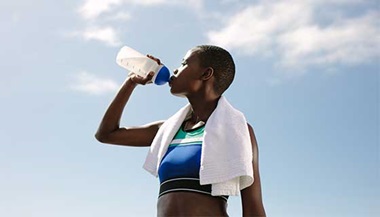Nutrition for Athletes: What to Eat Before a Competition
Featured Expert
The right nutrition is always important for athletes, but it becomes crucial when preparing for a competition. What you eat and drink before and during an event can help or harm your performance. Rayven Nairn, M.S., R.D., L.D., a dietitian with the Johns Hopkins University Student Health and Wellness Center, discusses why athletes should care about nutrition and how to make the right dietary choices leading up to a tournament, race or other major sports event.
The Role of Nutrition in Athletic Performance
All people should care about nutrition, but sports participation places unique demands on the body. This means that nutrition can help (or hinder) athletes in different ways:
- Nutrition provides the body with energy. Athletes burn through their energy stores faster than an average person, especially during a competition, so their energy demands are higher. Burning more calories than you consume can not only affect sports performance, but can also lead to health issues such as fatigue and increased risk of stress fractures. When an athlete does not get enough energy from food relative to the amount of energy they are burning, it is called relative energy deficiency in sports (REDs). The key sources of energy in the foods we eat are carbohydrates, fats and proteins, and it’s crucial for athletes to consume these in a balanced way.
- Nutrition helps the body heal. Exercise is meant to cause micro-damage to the muscles by challenging them to handle more weight or resistance, and competition is often more intense than a regular workout. The good news is that muscles rebuild themselves bigger and stronger. It is also important to note that protein is rarely used as an energy source; rather, protein plays a major role in helping the muscles and other tissues recover. However, too much protein can increase the risk of dehydration and calcium loss.
- Fluids regulate hydration and body temperature. Fluids are part of nutrition, too! Getting enough water is especially important for athletes, who tend to lose fluids faster than an average person due to increased sweating, especially when padding and extra sport gear are worn in sports like football and lacrosse. Plus, many competitions are outdoors, and hydration is crucial when competing on a hot day.
- Nutrition affects body weight. Weight is important in certain sports such as wrestling, where it determines in which group an athlete competes. Many athletes feel pressure to meet specific weight goals. Working with a dietitian can help make sure your health and performance don’t suffer in your efforts to control weight.
- Nutrition is important for overall health. When the body has all the nutrients it needs, it means you can function at your best both mentally and physically. Nutrition also helps support your immune system, helping you have fewer sick days.
What should athletes eat before a competition?
When it comes to competition, it can matter what you eat as far ahead as a week before the event. Generally, athletes should follow their regular diet as they train, have a balanced meal the night before and the morning of the competition, and a snack right before the competition.
Weeks Before the Competition
While training for the competition, athletes should eat a balanced diet consisting of about 60% carbohydrates, 20% protein and 20% fat, although this can vary by sport and position. Incorporating a variety of foods in one’s diet, such as whole-grain bread and cereals, green, leafy vegetables, fruits, lean meats and low-fat dairy can prove beneficial for overall performance. Drink plenty of liquids to stay properly hydrated. This diet will help you have enough energy for your training regimen, help achieve optimal body weight and composition, and promote short-term and long-term health.
24 to 48 Hours Before the Competition
For most athletes, having a balanced meal the night before the competition, similar to the training diet, is the best choice. A balanced meal could consist of a 6-ounce grilled chicken breast, a bowl of pasta with a light amount of tomato sauce and a side of peas or corn. Or, you may opt for a sandwich with roasted chicken or lean turkey on whole-wheat bread, with lettuce or another vegetable to round out the meal.
For many athletes, competition means traveling to new places, which could mean limited food options and unfamiliar foods. It’s best to stick to the foods you know sit well with you to avoid unpredictable reactions. Having to take multiple trips to the bathroom during the night will disrupt sleep and may affect next-day performance.
Athletes in certain sports may need a different approach for a pre-competition meal, called carb-loading.
What is carb-loading?
“For someone who is preparing for a marathon or half-marathon, or even soccer players whose games are extremely long, I like to recommend carb-loading before the competition day,” Nairn says. Carb-loading refers to eating a meal high in carbohydrates 48 hours to 24 hours before the competition. Such a meal may include foods like pasta, whole-grain breads, potatoes, rice and bananas.
Carb-loading is common in high-endurance sports that use a lot of energy, such as cross-country running, long-distance cycling and endurance swimming. It helps ensure the body has sufficient glycogen (the stored form of glucose) to use as energy reserves to last through the competition. Endurance athletes generally do not have significant fat storage, which the body uses as a secondary energy source. So when the primary energy source from recently consumed foods runs out, this can lead to cramping.
3–4 Hours Before the Competition
Your pre-competition breakfast should ideally happen three to four hours before the competition, to allow the food enough time to digest. If your competition is later in the day, this meal may be a lunch or early dinner. The meal should consist of half carbohydrates (50%) and the other half a combination of lean protein (25%) and colorful fruits and vegetables (25%).
- The carbohydrates should be a mix of complex carbohydrates (such as grains, breads, rice, pastas) and simple carbohydrates (such as fruits). They will be converted to energy you will need during the competition.
- Types of lean protein include eggs, tofu, chicken, lentils and fish. Protein is essential for promoting muscle growth and repair after the competition.
- Fruits and vegetables should represent a range of colors, such as tomatoes, watermelons, carrots, mangoes, apricots, chickpeas and eggplant. They contain a wide range of vitamins and minerals, such as vitamin C, B6, B12 and many others, that are needed during a competition and will help you recover after.
If your body does not tolerate a full meal before a competition, Nairn suggests a different approach: “I recommend smoothies because a smoothie in itself could be a balanced meal. And because it’s blended, it’s easier to digest.” The smoothie should incorporate the same nutritional balance as a standard meal.
Along with your morning meal, you will want to make sure you are drinking enough fluids to stay hydrated during the event.
What if I have a weigh-in?
For many strength-based competitions (rowing and weightlifting) and combat sports (wrestling, boxing and mixed martial arts), athletes need to pay attention to the timing of the weigh-in. If your weigh-in is in the morning, it may be difficult to have a meal within the three-to-four-hour window. Your pre-competition meal may be closer to two or sometimes one hour before the competition. In this case, you should boost the amount of carbohydrates you eat. “We want to ensure that you have your reserves set up” Nairn says. “Then, within one hour, maybe 30 minutes before, focus on hydration and simple carbohydrates.”
An Hour to 30 Minutes Before the Competition
Keeping your energy levels high during the competition will help you be at the top of your game, so it is recommended to have a small snack within 30 minutes of the event. Your morning meal has been digested and placed in your energy reserve, while the snack is used as an immediate source of energy. Between these two energy sources, you should have enough energy to get through the competition.
The snack should consist mostly of simple carbohydrates, something like a granola bar, trail mix or whole-grain crackers with hummus cups. “I like to recommend crispy rice treats,” Nairn says, “because it is easy to get a hold of and it is quick energy.”
During the Competition
Not all competitions allow for a snack break, but some athletes have time between sets or are able to pause for a quick pit stop. Staying hydrated is a priority, especially during a hot day, which increases water loss through sweating. If you have time for a quick snack, “applesauce is a great option as it has a liquid texture, making it easy to digest, and has both simple and complex carbs,” recommends Nairn. Granola or protein bars also make great snacks if you have a break during your competition.
Foods to Avoid Before a Competition
While many foods give you an energy boost, some foods could hurt your performance. Things to avoid adding to your pre-competition meal plan include:
- Foods high in fat. These foods can make your body feel sluggish because fat takes a long time to digest. Nuts, fried foods, whole-milk dairy products and red meats are considered high in fat. These foods can also cause you to feel full before you have consumed enough carbohydrates, which you need as an energy source.
- Foods high in lactose, such as milk, yogurt and cheese, as lactose may cause nausea or upset stomach.
- Foods high in fiber. Fiber requires a lot of energy to pass through the digestive system, which could cause gas, bloating, abdominal cramping or diarrhea. Blood rushes to the gut to help move the fiber along. Foods high in fiber include beans, berries and broccoli.
- Caffeine. Caffeine can be dehydrating, which can lead to cramps, so it is best to avoid caffeinated beverages the day of your competition — unless you are a regular caffeine drinker, because cutting out caffeine the day of competition could lead to a withdrawal headache. If you drink caffeine regularly, make sure to drink additional hydrating fluids before the event.
Along with these groups, avoid any foods you know do not sit well with you. You know your body best; if eggs consistently cause intestinal distress, it is best to skip them, even though they offer lean protein. Keep it simple by focusing on your go-to foods while keeping in mind the dietary recommendations.
Does the athlete’s professional level play a role in what they should eat before a competition?
Nutritional needs can vary depending on the athlete’s professional level and their age.
- Youth athletes (elementary through high school) typically do not need as much fuel at each meal as older athletes, but they may need to eat more frequently because they are still growing.
- Collegiate athletes who are in the beginning of their career are also still growing, so they should favor frequent meals to fuel growth. To protect the body from injuries, all college athletes should also ensure they are getting enough vitamins and minerals from the food they eat. At the collegiate level, athletes often have access to a sports nutritionist like Nairn, who can help build the right diet plan for training and competition.
- Professional athletes tend to have faster metabolism than youth and collegiate athletes, which allows them to tolerate eating heavier meals before a competition. “The most important aspect of nutrition for professional and elite athletes is protecting the body from injury by ensuring you have adequate energy and the vitamins and minerals you need,” Nairn says. This means planning your meals ahead, always having snacks on hand and eating foods rich in vitamin C, vitamin D, magnesium, zinc and calcium.







